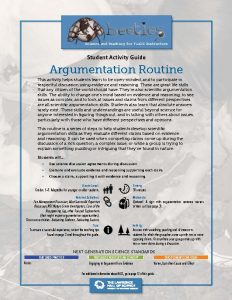This activity helps students learn to be open-minded and to participate in respectful discussion using evidence and reasoning. These are great life skills that any citizen of the world should have. They’re also scientific argumentation skills. The ability to change one’s mind based on evidence and reasoning, to see issues as complex, and to look at issues and claims from different perspectives are all scientific argumentation skills. Students also learn that absolute answers rarely exist. These skills and understandings are useful beyond science for anyone interested in figuring things out and in talking with others about issues, particularly with those who have different perspectives and opinions.
This routine is a series of steps to help students develop scientific
argumentation skills as they evaluate different claims based on evidence and reasoning. It can be used when competing claims come up during the discussion of a rich question, a complex issue, or while a group is trying to explain something puzzling or intriguing that they’ve found in nature.
Students will:
- Use science discussion agreements during discussion.
- Examine and evaluate evidence and reasoning supporting each claim.
- Choose a claim, supporting it with evidence and reasoning.

